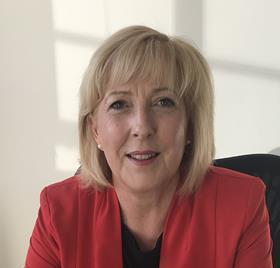By Fiona Reynolds (@Fireynolds), CEO, Principles for Responsible Investment

The PRI congratulates President-Elect Joe Biden and Vice President-elect Kamala Harris on their historic election win. We look forward with optimism to the new administration’s engagement on environmental, social and governance (ESG) issues, as an organisation focused on these issues – with governance a central theme of our work. Good governance mandates that every vote counts, and in the context of this election, we hope this principle is respected and that we see a peaceful and orderly transition of power to a new administration.
Investors in the United States—and around the world—are now looking closely at the new Biden administration and its domestic and international policy directions. There is much to be done. The government and the private sector need to work together to tackle the pandemic, address climate change and to build back better with an economic recovery that includes developing a new social contract, creating green jobs and delivering economic prosperity for all.
Prioritising social issues
At a social level, the central issues of structural inequality, income disparity and racial inequality are major domestic challenges for the incoming administration. Raising the minimum wage to ensure that it’s a living wage, improving labour rights and wholesale reform of the health system to ensure access for all are amongst the basic starting points.
Action on climate change
On the environment, the administration must pursue economic policies to address climate change. It must set a pathway to achieve net-zero by 2050. An inevitable policy response that is forceful and abrupt is gathering pace, undermining the value of high carbon investments and creating opportunities for green investments and jobs. The PRI has published guidelines for US policymakers to achieve net-zero by focusing on six priority areas: overall climate ambition and governance, zero carbon power, buildings, road transport, industry and land use. In the weeks and months ahead, the PRI will engage policymakers on the policy reforms set out in the briefing.
Reversing Trump-era rollback of ESG integration
Following the Trump administration’s efforts in recent years to roll back progress on ESG investing, the future standing of the US in the global movement towards responsible investing is one to watch.
At a domestic level, the integration of ESG considerations in investment policy and regulation has fallen behind in the last four years compared to progress in Europe and Asia. Simultaneously, the window of opportunity for American investors to remain at the forefront of global financial innovation and competition in navigating and mitigating the realities of climate and transition has begun to close.
The new administration must reverse the course that has been set by American regulators over the past few years. A 2019 executive order from President Trump directed the Department of Labor (DOL) to review regulation of private retirement plan fiduciaries (or “ERISA fiduciaries”) with an eye towards promoting the oil and gas sector. In response, the DOL proposed rules that, if finalised as proposed, will make it harder and costlier for ERISA fiduciaries to integrate ESG factors into their investment actions and participate in proxy voting aimed at advancing corporate responses to investors’ demands on ESG factors.
The DOL itself acknowledges that ESG factors can create business risks and opportunities, yet it is actively trying to prevent investors from considering those factors in their investment decisions. It’s no wonder that more than 95 percent of public comments on the proposed rule opposed it, including one from the PRI.
A new Congress will have the opportunity to overturn the rule through the Congressional Review Act. And the need for congressional intervention won’t stop at the DOL—The Securities Exchange Commission (SEC) recently finalised rules that make it more difficult for investors to participate in proxy voting to advance ESG factors. The PRIresponded to both the DOL and SEC.
Beyond reversing the tide of anti-ESG regulation from the Trump administration, US policymakers will need to advance new policies that support sustainable investing and strengthen accountability, good governance and shareholder rights.
Another priority should be establishing mandatory ESG disclosure for publicly traded companies. Investors need access to consistent, comparable data about material ESG factors in order to efficiently incorporate that data into their investment practices. The SEC could mandate such disclosures, or Congress could direct them to institute these requirements.
Reform is also needed to modernise fiduciary duties. Specifically, American regulators should require pension and investment fiduciaries to integrate material ESG factors into their investment processes. Altogether, laws and regulations from the DOL and SEC need to be updated to eliminate any uncertainty that fiduciaries have an obligation to consider ESG issues.
Re-joining the international community
At the international level, cooperation is back on the agenda. We must work together to restore faith in multilateralism and in global institutions. We welcome a clear commitment from America to re-join the Paris Agreement. There is an opportunity to revitalise climate action at G7 and G20 level, which has been effectively stifled since 2016. More than 70 regulators from around the world have come together to form the Network for Greening the Financial System (NGFS), working together to advance a sustainable financial sector. The US being in, rather than out of, the NGFS would give impetus to central banks and financial regulators to accelerate efforts to address systemic climate risks and tilt the global financial system towards a more sustainable footing.
A financial system for the 21st century
For the last four years, the Trump administration did a significant disservice to the standing of the US amongst global leaders on responsible investing, sustainability and climate action. Domestically, it favoured those voices and lobby groups who opposed transparency, accountability and investor actions to improve corporate behaviour. It has held back much of the change that is necessary for the financial system to be fit for purpose in the 21st century, where increasing expectations around corporate responsibility, social licence and impact have emerged.
The view that the financial system works solely to the benefit of itself and its actors and not wider society has led to much of the divide that we see in America today, to growing inequality between the ‘haves’ and ‘have nots’. In a financial system that helps deliver supercharged profits and salaries for a tiny minority while minimum wages are unmoving and basic healthcare is an unaffordable mirage for so many, we cannot expect anything else but opprobrium and a landscape fertile for populism.
The Biden administration can begin to turn the tide.
With a strong commitment from day one, and public counsel from the responsible investment community, including the PRI, supporting the new administration on domestic reform, international cooperation and global sustainability, there are real opportunities to make American finance great again.
To find out more, join our webinar on US Climate Policy in 2021: What Investors Need to Know, or register for the PRI Digital Forum: Americas where we’ll be discussing future priorities for responsible investment in the US and beyond in the wake of the election
This blog is written by PRI staff members and guest contributors. Our goal is to contribute to the broader debate around topical issues and to help showcase some of our research and other work that we undertake in support of our signatories.Please note that although you can expect to find some posts here that broadly accord with the PRI’s official views, the blog authors write in their individual capacity and there is no “house view”. Nor do the views and opinions expressed on this blog constitute financial or other professional advice.If you have any questions, please contact us at [email protected].








